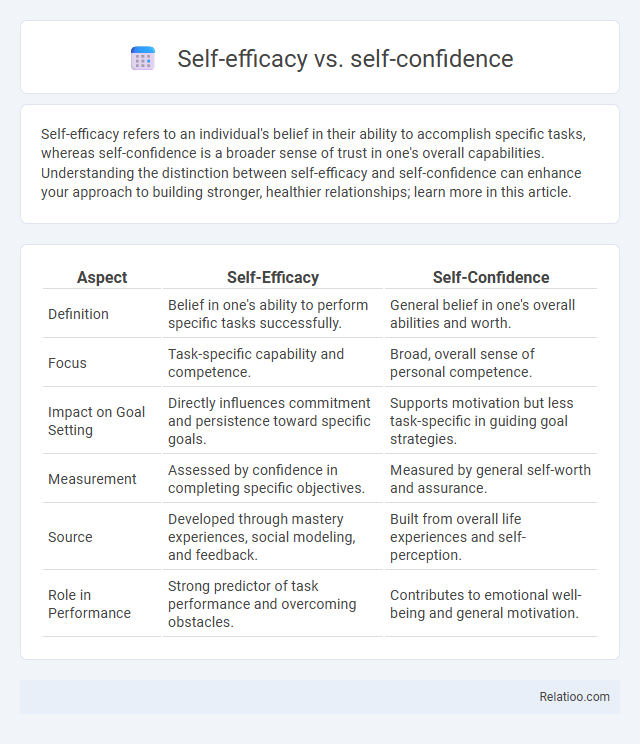Self-efficacy refers to an individual's belief in their ability to accomplish specific tasks, whereas self-confidence is a broader sense of trust in one's overall capabilities. Understanding the distinction between self-efficacy and self-confidence can enhance your approach to building stronger, healthier relationships; learn more in this article.
Table of Comparison
| Aspect | Self-Efficacy | Self-Confidence |
|---|---|---|
| Definition | Belief in one's ability to perform specific tasks successfully. | General belief in one's overall abilities and worth. |
| Focus | Task-specific capability and competence. | Broad, overall sense of personal competence. |
| Impact on Goal Setting | Directly influences commitment and persistence toward specific goals. | Supports motivation but less task-specific in guiding goal strategies. |
| Measurement | Assessed by confidence in completing specific objectives. | Measured by general self-worth and assurance. |
| Source | Developed through mastery experiences, social modeling, and feedback. | Built from overall life experiences and self-perception. |
| Role in Performance | Strong predictor of task performance and overcoming obstacles. | Contributes to emotional well-being and general motivation. |
Understanding Self-Efficacy: Definition and Foundations
Self-efficacy refers to your belief in your ability to succeed in specific situations or accomplish a task, rooted in Bandura's social cognitive theory, emphasizing the role of observational learning, social experience, and reciprocal determinism. It differs from self-confidence, which is a more general sense of trust in your abilities, and self-esteem, which reflects overall self-worth. Understanding self-efficacy involves recognizing its foundation in mastery experiences, vicarious experiences, verbal persuasion, and emotional states that together shape your motivation and performance.
What Is Self-Confidence? Key Concepts Explained
Self-confidence refers to your belief in your ability to succeed in specific situations or accomplish tasks, grounded in past experiences and skills. Unlike self-efficacy, which is task-specific, self-confidence encompasses a broader sense of trust in your overall abilities. Building self-confidence involves consistent positive reinforcement and mastery of challenges to strengthen your perception of competence.
Core Differences Between Self-Efficacy and Self-Confidence
Self-efficacy refers to an individual's belief in their ability to successfully execute specific tasks, whereas self-confidence is a broader, general sense of one's overall worth and capabilities. Core differences include self-efficacy being domain-specific and linked to task performance, while self-confidence influences a wider range of behaviors and emotional responses. Research by Albert Bandura highlights self-efficacy's role in motivation and resilience, distinguishing it from the more general and less task-focused nature of self-confidence.
Psychological Theories Behind Self-Efficacy
Self-efficacy, a core concept in Bandura's Social Cognitive Theory, refers to an individual's belief in their ability to achieve specific tasks, influencing motivation and behavior. Unlike self-confidence, which is a broader and more generalized sense of trust in one's abilities, self-efficacy is task-specific and context-dependent. Psychological theories emphasize that self-efficacy develops through mastery experiences, vicarious learning, verbal persuasion, and physiological states, shaping resilience and performance outcomes.
How Self-Confidence Shapes Our Behaviors
Self-confidence significantly influences our behaviors by driving the motivation to take risks and pursue goals, shaping how we approach challenges and social interactions. Unlike self-efficacy, which relates to belief in specific task performance, self-confidence reflects a broader sense of personal worth and capabilities that impacts decision-making and resilience. Developing strong self-confidence fosters proactive behaviors, improved communication, and persistence, ultimately enhancing overall life satisfaction and achievement.
Measuring Self-Efficacy vs Self-Confidence
Measuring self-efficacy involves assessing an individual's belief in their ability to perform specific tasks, often using task-specific scales like the General Self-Efficacy Scale (GSES). Self-confidence measurement tends to capture a broader sense of overall confidence in various situations, typically using global self-confidence questionnaires. Your successful development hinges on distinguishing these constructs accurately to tailor personal growth strategies effectively.
Practical Implications in Daily Life
Self-efficacy, self-confidence, and self-esteem each impact your daily decision-making and motivation differently; self-efficacy influences your belief in completing specific tasks, self-confidence relates to a general sense of ability, and self-esteem reflects your overall self-worth. Practical implications include using self-efficacy to set achievable goals and tackle challenges proactively, relying on self-confidence to engage in social or professional interactions, and nurturing self-esteem to maintain mental well-being. Understanding these distinctions enables you to foster resilience, improve performance, and enhance personal growth in everyday situations.
Building Self-Efficacy: Proven Strategies
Building self-efficacy involves developing your belief in your ability to succeed through mastery experiences, social modeling, and positive reinforcement. Unlike self-confidence, which reflects a broader sense of trust in your abilities, self-efficacy specifically targets your conviction to accomplish particular tasks or goals. Techniques such as setting achievable goals, seeking constructive feedback, and practicing resilience significantly enhance your self-efficacy and improve performance outcomes.
Boosting Self-Confidence: Effective Techniques
Boosting self-confidence involves practical techniques such as setting achievable goals, practicing positive self-talk, and visualizing success to reinforce your belief in your abilities. Understanding the difference between self-efficacy--the belief in your capacity to execute tasks--and self-confidence--the overall trust in yourself--helps tailor these strategies effectively. Consistent application of these methods strengthens both self-efficacy and self-confidence, empowering you to face challenges with resilience and assurance.
Choosing the Right Mindset: Self-Efficacy or Self-Confidence?
Choosing the right mindset involves understanding the distinct roles of self-efficacy and self-confidence in your personal growth. Self-efficacy refers to your belief in your ability to accomplish specific tasks, directly influencing motivation and persistence in challenging situations. In contrast, self-confidence is a broader sense of self-assurance that may not always be tied to particular skills or outcomes but still impacts your overall attitude and approach to new experiences.

Infographic: Self-efficacy vs Self-confidence
 relatioo.com
relatioo.com